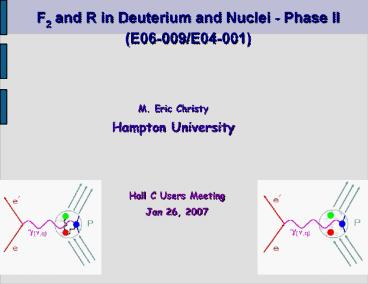Hall C Users Meeting - PowerPoint PPT Presentation
1 / 18
Title:
Hall C Users Meeting
Description:
FL, F1, F2 Fundamental Structure Function Measurements on Deuterium and Nuclei ... Strength in the Nucleon Resonance Region for Deuterium and Nuclei ... – PowerPoint PPT presentation
Number of Views:24
Avg rating:3.0/5.0
Title: Hall C Users Meeting
1
F2 and R in Deuterium and Nuclei - Phase II
(E06-009/E04-001)
M. Eric Christy Hampton University
Hall C Users Meeting Jan 26, 2007
2
E06-009 E04-001 Physics
- FL, F1, F2 Fundamental Structure Function
Measurements on Deuterium and Nuclei - Structure Function Moments
- Lattice QCD comparisons
- Singlet and non-singlet distribution functions
from deuteron and proton - Support Broad Range of Deuteron Physics
- Elastic form factors
- BONUS neutron structure functions
- Input to extract spin structure functions from
asymmetry measurements. - Important input for neutrino physics
- Quark-hadron duality studies
3
Inclusive e A ? e X Scattering
Rosenbluth Separation Technique
Where ? flux of transversely polarized
virtual photons ?? relative longitudinal
polarization
4
Reproduce successful precision proton L/T
separations.
E94-110 performed 195 separations!
5
Global Survey of Longitudinal Strength in the
Nucleon Resonance Region for Deuterium and Nuclei
Q2
x
W2 W? pion threshold
W2 4 GeV2
Essentially NO L/T separated data exist in the
resonance region currently!
6
FL sensitive to gluon distributions..
- Nucleon structure composed of singlet (gluons,
sea) and non-singlet (valence)
distributions - At moderate x ( 0.3), singlet comparable to
non-singlet - Large uncertainties on singlet distribution in
structure function
measurements, comes from (small) scaling
violations in F2
- FL is directly sensitive to glue!
7
?(2F2p F2D)dx yields non-singlet distribution
- Q2 evolution is simpler for the non-singlet
(reduced number of splitting functions) - Assuming a charge-symmetric sea, p-n isolates
the non-singlet - Need to pin down non-singlet (p-n) to extract
singlet (FL) - ..highly precise deuteron data - due to the
above aspects - - are forming a conditio sine qua non for any real
precision test of QCD. Johannes Bluemlein - For similar reasons (non-singlet calculations),
p-n moments are now available from lattice QCD at
Q2 4 GeV2!
experiment
Lattice QCD calculations
8
- Moments of the Structure Functions
- Mn(Q2) ?dx xn-2F(x,Q2)
- Calculated on the lattice at Q2 4 GeV2
- Well understood in QCD Operator Product Expansion
- For proton, n 2 F2 moment 0.182 /- 0.006
- For deuteron, n2 F2 moment / nucleon 0.165 /-
0.008 - In the difference, uncertainties in R matter!
- Moreover, cant even obtain FL moments really
missing resonance region data!
percentage contribution of resonance region to
total moment (from proton moment data)
9
BONUS NEUTRON cross sections via spectator
tagging
to CLAS
Change in F2 with R
spectator tagged in radial TPC
Uncertainty in R introduces 5 uncertainty -
true for all F2 extractions from cross sections
(CLAS deuterium as well as BONUS)
10
BoNuS combined with inclusive deuterium gt
help pin down nuclear corrections with BoNuS
gt correct L/T separated deuterium
structure functions to get out neutron
L/T SFs!
11
Neutrino Oscillations ?m2 E / L, requires E in
few GeV range (same as JLab!)Input for neutrino
cross section models, needed for new generation
of oscillation experiments around the world
Jlab measurements can provide input on vector
couplings
Resonance region is a major contribution!
12
Jlab E94-110 measurements confirm SLAC hydrogen
Rosenbluth results for GEp/GMp!
Discrepency from PT results now ascribed to
radiative 2-photon effects2-photon effects on
GEn should be larger than proton
Blunden, Tjon, Melnitchuk, Phys.Rev.
C72 (2005) (Rosenbluth measurements could
result in GEn2 lt 0?)
Form Factors for Free
13
The curves are from a fit to other Hall C
Deuterium data (largely at higher Q2, all not L/T
separated).
14
Phase-I Carbon Cross Sections for L/T Separations
(Q2 2)
e? 0.9011
ep 0.9164
e? 0.8171
ep 0.8437
e? 0.6171
ep 0.6629
Need Phase-II data to supply additional epsilon
points, even for Q2 lt 2.5.
15
- L/T Separation Data Targets D, C, Al, Fe -
Final uncertainties 1.6 pt-pt in ? (2
normalization) - essentially, duplicate proton
data set.
Phase I kinematics (Jan '05)
Proposed Phase II kinematics
L/T separations where multiple energies.
16
projected from hydrogen
current deuterium
After phase II data!
- No L/T separated resonance region (large x)
data on deuterium currently (little
on heavier targets) - Impossible to extract high precision moments
- Moments available
- Compare to lattice
- FL to access singlet
17
- Low HMS hodoscope efficiencies
Hodoscope refurbishment - see talk by
Vardan
Tadevosyan - Problems setting and locking hms dipole
New HMS controls - see talk by Steve
Lassiter
- Thick HMS exit window (20 mil Ti)... large
multiple scattering at low E' -gt serious
reconstruction issues!
New Al exit window
installed.
18
- Stable Beam - position and energy
- Stable BCMs
- High trigger efficiencies
- Veto pions with Cerenkov
- Stable magnet Fields































